Preliminary Analysis of Micro Agro-ecological Entrepreneurships Commercialization: A Case Study of Agro-ecological Producers in the “El Valle” Community
Abstract
This work is a preliminary analysis of the design of a commercialization mechanism to help the creation of small and medium-sized enterprises with new competitive advantages in the southern communities of Ecuador known to the scientific community. The conceptual basis mainly considers approaches of sustainability, fairness and responsible trade and partnership. It considers the value chain and the final product as a differentiating offer which means that the truly attractive resource should be the organic product that combined with creative marketing strategies could please the customer and foster its recommendation.
Keywords: Agro-ecological productsentrepreneurshipassociationsfair trade
Introduction
In recent years, the entire world has shown its concern about the effects of pollution and environmental degradation. Organic agriculture seems to be a protective alternative that, in the future, might show meaningful benefits to the society. Unhealthy eating habits and the tendency for consumerism have increased the cost of people’s health care which has created an opportunity for small farmers and their business ventures.
This field requires significant attention. Agricultural policies must be considered to support and recognize the labor of the producers. According to Pérez Calderón (2004) who cites Queitsh (2002), the author considers that organic agriculture can be a form of socially responsible production which prioritizes sustainable development in the countryside areas and integrates the protection of the nature to the value chain, the associativity, and creative commercialization.
In this market, the consumer has definitely the main role. A lot has been said about the consumer’s behavior creating several lines of investigation such as the purchase decision, ethics and consumer’s responses, the implicit morality in consumption, the effects of advertisement, among others (Vitell, 2003; Holt, 1997; Crane, 2005).
In order to promote organic agriculture in developed countries, responsible consumers who are aware of their purchases are taken into consideration. Years ago, the green consumer had his boom as one who had environmental concerns when purchasing products or services; that along with a responsible behavior, would currently make people potential consumers for small producers (Dueñas, Perdomo, & Villa, 2014).
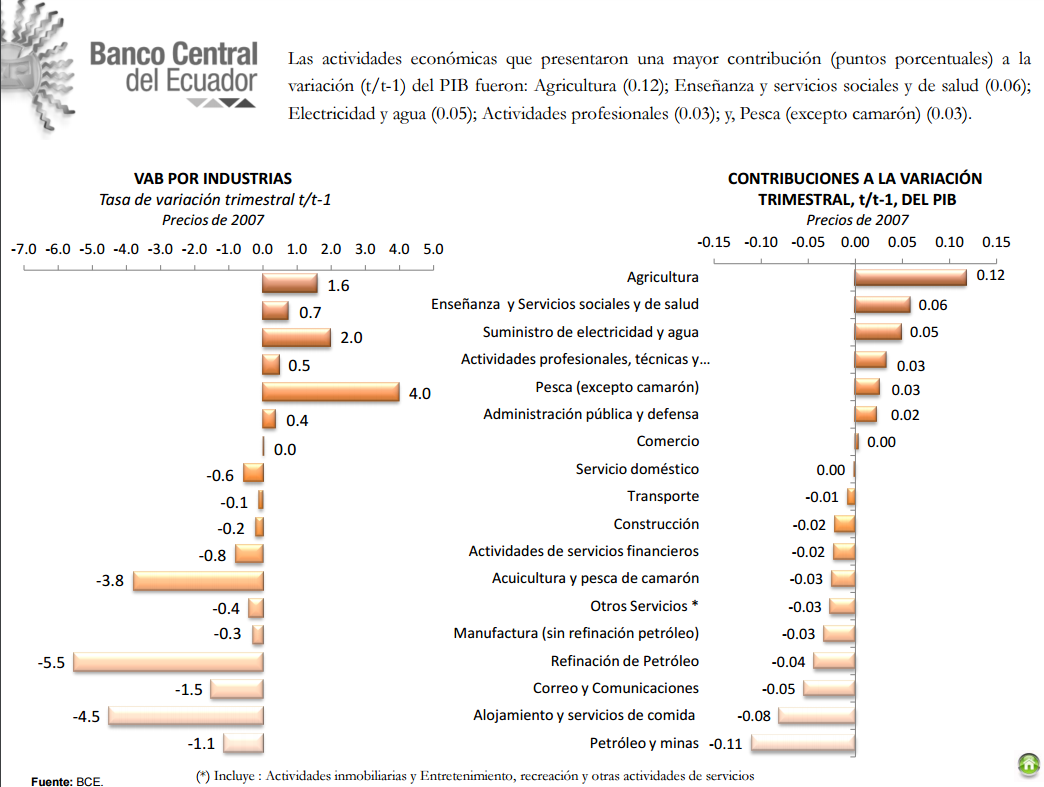
In Ecuador, the presence of small and medium-sized enterprises is significant, but even greater is the impact that agriculture reaches in the GDP (Gross Domestic Product). In the case of the communities in
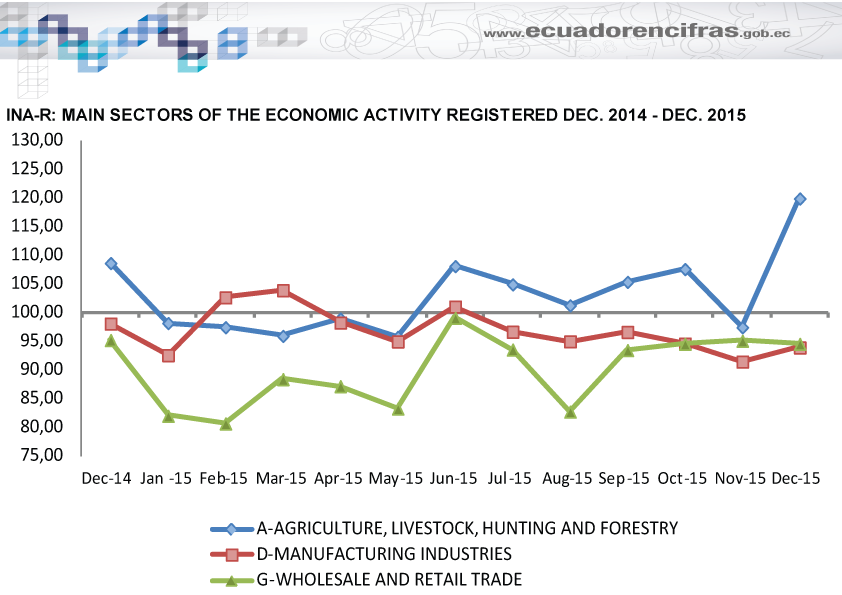
One of the concerns of the producers lies in the way of commercialization of their products. As they do not have an important amount of customers, they have not been able to increase their production. In response to the previous approach, this paper aims to present a commercialization methodology that allows them to make use of the real competitive advantage of the agro-ecological products offered by rural business ventures, mitigate uncertainty, and reduce the risk to move them to an eco-friendly business concept that ensures their growth and success in the market.
Findings
In a globalized world where commercial competition has a lot of influence, it is not possible to stop contemplating the different possibilities of development. Population is more demanding day after day because it has all the information and the means for getting it. There is no way in which experience does not come up with creative strategies to boost the value chain as a whole. Porter highlights the importance of such a concept by dividing it into primary activities of support and margin. The model he proposes follows an inclusion of every functional area of a company where every element is important, overtakes the first approach by the firm McKinsey & Co through the level of degrading of the variables and adds up the concept of generic strategies where Cost Leadership, Separation and Perspective are included as alternatives for organizations. (Porter, 1990)
Lovelock & Wirtz (2015) deeply analyze the value proposition and complementarity of products and services; therefore, they propose a model called “The Flower of Services” whose core is the basic product, or the satisfaction of a need itself, and the petals are formed by two kinds of complementary services, one for facilitation and the other one for improvement. The first one involves assistance and delivery of needed information for goods or services production or commercialization, whilst the second one offers an added value contributing to the creation of a competitive advantage.
In general, models work to optimize the results of commerce and economy as well as the improvement of the community’s lifestyle, which promotes the personal growth of those who participate in it on a daily basis.
Commerce from its very beginning has been considered as one of the human solidarity breaking factors, despite the fact that evolution of European society has proved that it represents the entrance to innovation and development which, at the same time, manages to control the local survival pattern. Commerce has been considered a development vehicle; it represents a space of innovation as a result of an institutional change based on ethical principles. (Mendoza, 2003)
Development of innovative strategies represents an analysis which comes up with classic concepts such as Marx’s, satisfying needs generates new needs; this confirms the theory which states that nowadays competition is born in markets and its requirements. On the other hand, competition as a whole has been a discussion subject by different authors; (Lombana & Gutierrez, 2009), (Maya Carrillo, Lara Burbano & Maldonado Mera 2016) and (Garcia Vega, 2011) agree when considering Porter (1990) as a main foundation, who encloses the relevance of competition, attributing success to the main circumstances that promote the development of a strategy on a defined area. Companies are successful due to self-generation of characteristics which ease the creation and hold of a competitive advantage, in other words, increasing productivity.
Fair Commerce in Agro-ecology
It is of common knowledge that agro-ecology in Ecuador is not one of the most valued activities. There are societies that due to alimentary bad habits have chosen the consumption of organic products, which contributes to the decrease of serious illnesses rooted in this main problem.
Fair commerce has a main goal which is managing operations at a suitable cost that takes into account the effort used in the production of such a good, the environmental concern and the labor conditions needed for that purpose. Organizations that join the business support the manufacturers to fix prices; therefore, fair commerce must be taken as a mechanism whose purpose is getting a more progressive redistribution though commerce. It does not represent a gift at all; actually it is the fair payment for a quality and decent work. (Amador Betancourt, and others, 2015)
Having analyzed these facts, it is mandatory to say that agro producers from “El Valle” Community do not value their own work when trading. It is true that they take advantage of it within the family since the biggest part of their production is for self-consumption, but it is necessary to train these organizations so that they might be the first ones to value their work and at the same time their society by using other communities’ experiences, they will prefer healthy products and value the producer’s effort by paying the right price.
Agro-ecology expressed from the point of view of solidary economy
Solidary economy is taken as a change of priorities inside a neoliberal system. It is about presenting it as a vision and practice that identifies economy as a tool that serves people and communities’ development. This kind of fair commerce tries to locate commercial relations based on direct trading and mutual respect. Such a criterion promotes new opportunities for less fortunate areas as well as decent work conditions and environmental worries. (Amador Betancourt, and others, 2015)
Every perspective exposed on this paper is entirely opposed to consumerism, considering this last element as a result of marketing, the will to make disposable products, inappropriate waste of recyclable materials, and others. Sustainable production uses a system that allows to produce for a long time without damaging the environment and obtaining a good profitability. (Agüeros Sánchez, Rodríguez Reyes, & Betel de la Torre de León, 2015)
The organizations from
Promoting agricultural projects is already a push for certain vulnerable areas which haven’t been valued enough. At the same time, they are a foundation which strengthens the current economy pace for the implication of this activity in GDP.
Citizen participation as part of the agro-ecology system
Citizen participation, which is linked to sustainable and social human development, has a great impact on the economy development. Author (Pastor Seller, 2011) in one of his publications points out the classic approaches of the human needs theory and mainly cites (Doyal y Goug, 1994) and (Manfred, Max-Neff, 1984) who mention that participation is a human need which acquires a strategic value when it intervenes directly and transversely which collaborates to meet the other needs.
It is needed to consider that from that reflection, the agro-ecology products have the possibility to generate strategies in favor of people’s business. The society itself should take the role of a promoter of the value of its own products and work, at the same time, on strategies that guarantee a sustainable competitive advantage in the future.
The participation is not only considered from the client’s side but also from the producers’. A point which has encouraged several families to be an active part of the commerce is associativity which is directed by means of organized citizen groups that share both needs and benefits.
The long-term vision of the associations under study should be demarcated in the exercise of a cooperative with the objective at an organizational level to even be able to provide with loans to the associates to improve production at all its levels.
Methodology
The research is mixed type since it is based on semi-structured interviews, surveys, and a bibliographic review in index data bases.
A census was intended to be carried out with the members of the
The socio-economic situation of the association members.
Productions as a result of the members’ economic-productive activity.
Ways of commercialization of those results.
Facts linked to the members’ perspective and attitudes towards associativity.
In addition, semi-structured interviews were carried out with the members of regulation entities (GAD, MAGAP) where the property was prioritized. During the bibliographic review, high-impact magazines, which are able to provide different perspectives on the structure of agro-ecology endeavors, were used. This fueled the proposal with a view that exceeds the country’s borders.
Results and Discussion
Prior to establish a proposal in favor of the current value chain developed as a result of the project executed by Salesian Polytechnic University entitled Source: “Primary Information Project “Community intervention for the development of solidarity economy business with productive associations from
The 9 associations are supported by GAD (Autonomous Decentralized Government) to achieve a better production through different projects.
Each family nucleus works on their own land since they do not have infrastructure to act as an association.
Production is not planned.
The production is allocated to self-consumption, and the surplus is commercialized.
The main places to commercialize are public and open markets in town.
There is not a value proposition design for the client.
Target public is not defined.
Preliminary data about the producer associations from
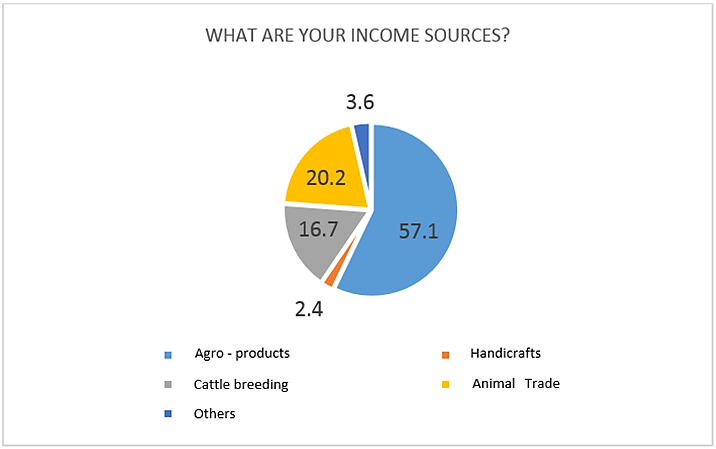
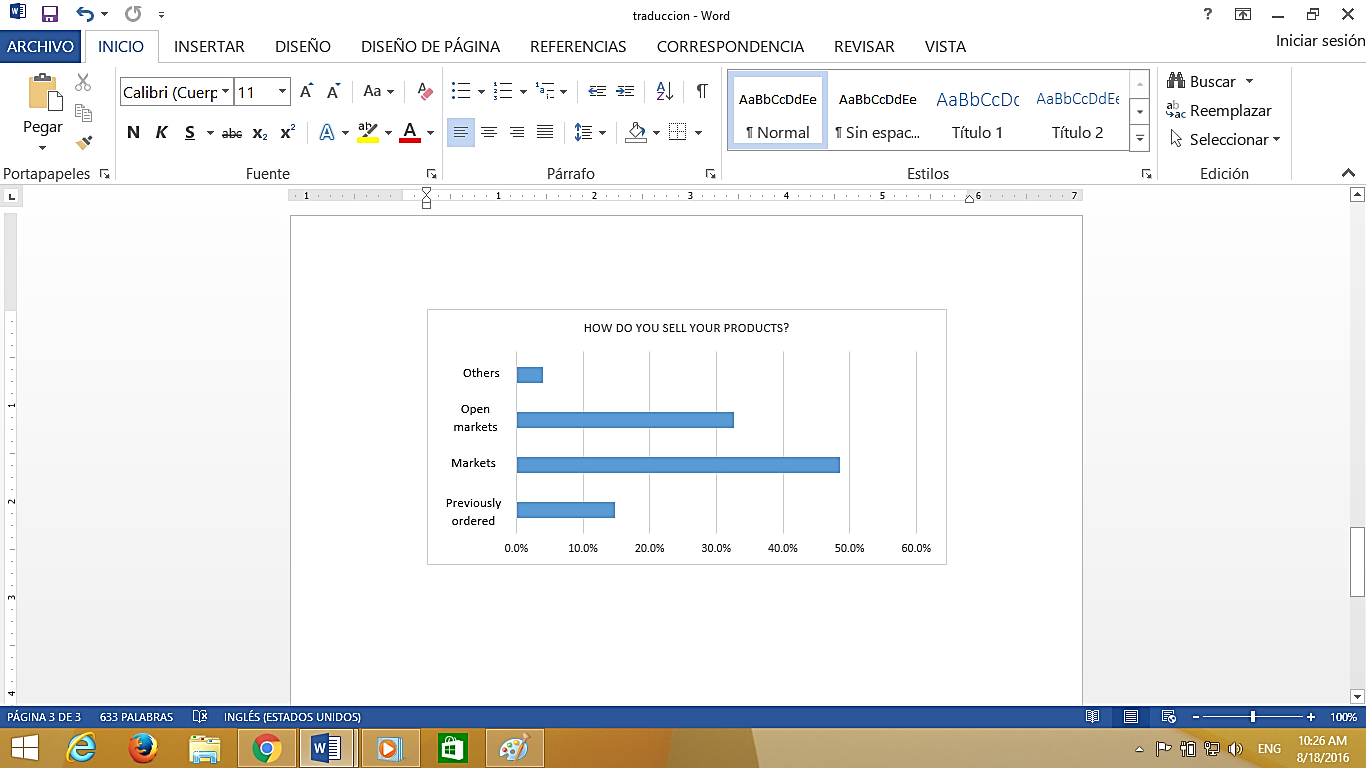
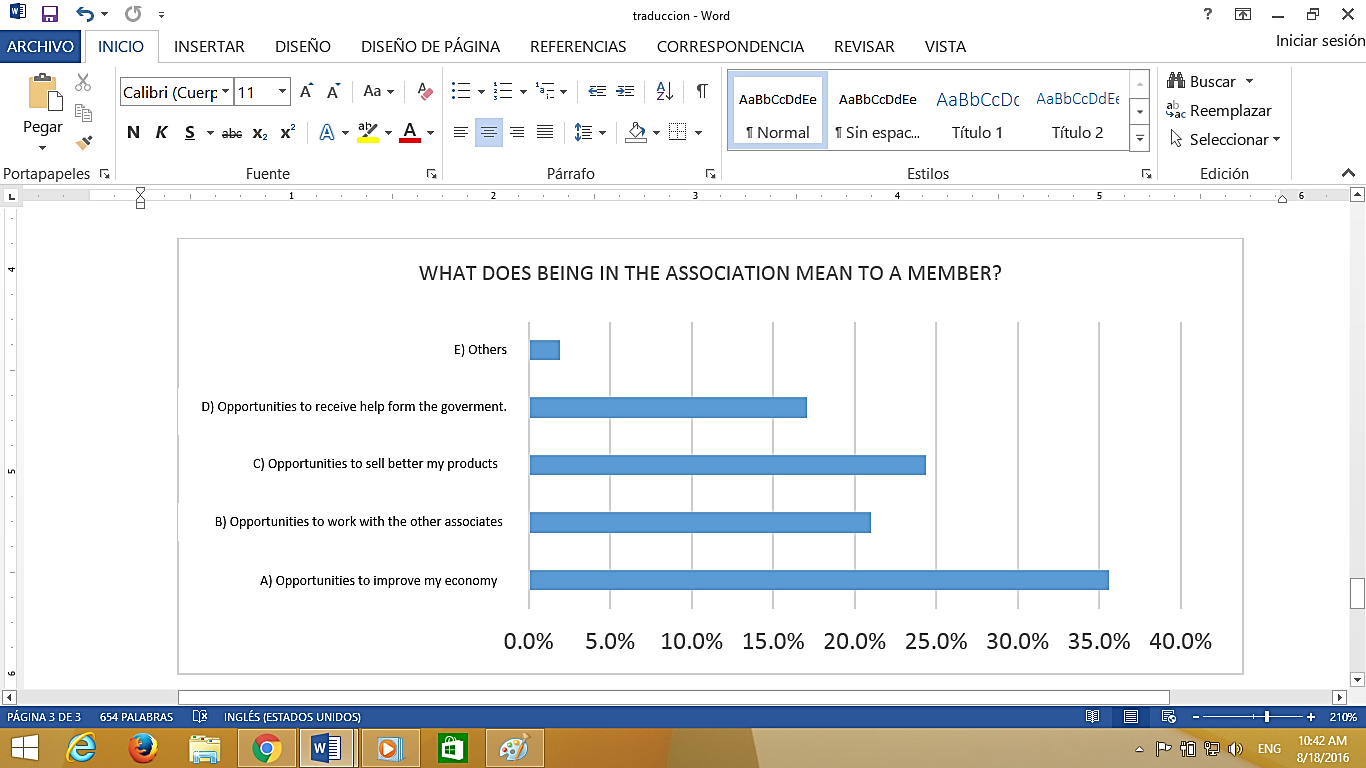
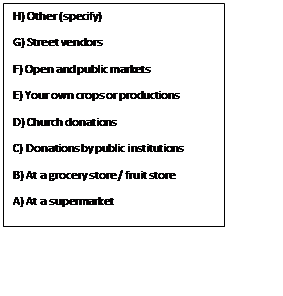
In turn, it is necessary to take into consideration that most people prefer to get their products from open or public markets, therefore it can be inferred that there is a relevant preference towards agro-ecological production and, if the value proposition to be developed meets the additional needs of the client, success is guaranteed.
Regarding what has been stated, this proposal is based on Porter (1990), for which the following is considered previously:
To define the product: Currently, the products offered by the associations located in
El Valle community are not being properly valued. According to the Royal Academy of the Spanish Language, an agro-ecological product is manufactured or produced without the use of chemical substances that may harm the environment. In turn, the International Federation of Organic Agricultural Movements defines organic agriculture as “an agricultural system that, from an environmental, social and economic stand, promotes healthy and safe production of food and textile fibers.”
Taking this reflection as a starting point, the product must be defined with a basic offer and some specific guarantee. One of the strategies that must undoubtedly be implemented is to get a product quality certification and, although it is not possible to obtain it from international organisms, a first step can be to have some sort of certification generated by one of the regulation entities of the associations, such as the community GAD; this organism might make use of its technicians to undergo permanent verifications.
To define the target population: After checking the theoretical bases, it is necessary to state that citizen participation is of great value; it is evidently fundamental in the marketing of products. In the specific case of agro-ecological products, market niches that comply with the associations’ necessities should be defined.
A market niche, in the words of Kotler (Kotler & Armstrong, 2013) is a small market (unlike market segments which are bigger) with needs that are not being properly taken care of; a group of people with specific needs and desires, with enough purchase power to satisfy them and the will to do so.
A market niche with certain specificities is necessary for the offered product. The market niche must be aware or willing to educate itself regarding the consumption of organic products, purchasing power, purchasing will, minimal effort in the search for options, reliance on certified products and potential spokesmen.
With such a diverse market, the first option is the nearest option, therefore it is intended to take a look into the teaching field. Can teachers be identified as potential clients? Upon analyzing the aforementioned demands, this seems to be a good option. Once applied, it would support the development of research projects as well as creating bonds between the Institution and the community.
Value proposition: The agricultural production associations in
El Valle offer healthy organic products that possess a local quality certification, which guarantees a free of chemicals food consumption as well as environmental protection.
Every product needs to be identified. The value proposition is empowered when the final outcome shows that a product is unique within the market because of the value it conveys. From a marketing standpoint, the most advisable course of action is to establish a BRAND; without it, it is not possible to clearly portray the advantages of the product. It is understood that it would not be possible to speak about brand positioning without previously defining it.
Michael Porter, one of the classic authors in the study of the value chain considers that it is composed of primary activities, supporting activities and a margin. One of the primary activities is precisely “Marketing and Sales”. Given that agro-ecological associations have self-consumption as their main goal, they do not make use of these tools. Commercialization has taken place at open and public markets, but these channels have not been efficient enough.
The marketing process represents the biggest weakness the associations suffer; thus, production has not been incremented. The proposal is based on a complete system where the target public is informed or educated regarding organic products and their benefits, granted easy payment terms as well as a customized product and saves time when buying.
In order to offer the product and guarantee the correspondent payment, it would be beneficial to form strategic alliances with syndicates and employee associations in solid enterprises within the market, making it possible to:
Start a test process for the system and the product.
Apply a survey in order to know the family structure of the partners in general (number of members).
Educate the partners, both virtually and face to face, regarding the benefits of consuming organic products and the meaning and relevance of local certification.
Use an institutional e-mail to communicate information.
Have an option for direct discount in payroll.
Deliver the products at the associations’ premises.
Have a brand presence around the institution.
Generate suggestions.
As a result of the first experience, it is expected that the product will be customized in the least possible amount of time. Although it is necessary to know the consumer in depth to deliver a product that fits his or her preferences, in the case of agricultural production associations the marketing system can’t be confused with “informal market” since the proposal aims to deliver “A BASKET WITH BRAND PRODUCTS”, which according to the season will be composed of: vegetables, fruits and tubers. Now, acquisition of this kind of products is directly related to the amount of family members, and not adapting to the client’s needs might discourage repurchase.
Elaboration of varied baskets regarding products, but standardized regarding amounts is proposed. An added value can be incorporated to this marketing mechanism: a brochure that is informative but also serves as a recipe book. The goal is to inform the benefits of each product in the basket, and preparation alternatives according to an average diet.
In accordance to the model proposed by Lovelock & Wirtz (2015) the flower of service is in this case given by:
Main product: Agro-ecological food
Complementary services:
Help services:
Informative booklet.
Recipe book that includes the products in the basket.
Information via e-mail for all the partners of the Institution where it is marketed (benefits and payment terms information).
Awareness campaigns regarding healthy products.
Improvement services:
Local certification of the quality of products.
Home delivery.
Payment methods
Therefore, it is expected that the 9 associations belonging to
Creation of brand.
Design and Implementation of Corporate Image.
Direct Marketing Campaigns.
These types of alternatives allow the public to easily identify both the company and the brand. This would be a first step to enter new markets and reproduce this first exercise in other scenarios.
It should be recalled that this first experiment would be carried out in a market where direct marketing, specifically the recommendations, has a great place. Cuenca is a city where attraction towards newness is part of consumer behavior, in this way, the first-hand associations must meet the needs of the customer. If the entire process is handled according to prior planning, the results will be the best introduction to a next test.
Initial experience extrapolation will allow the brand to initiate a process of market positioning, in this first step, the product can be identified at a stage of introduction. A second stage can be the increase of distribution channels, where the intermediaries make up a good option. Supermarkets may be beneficial; they allow to establish a market development. It is valid to note that the company, being “new” in the market, should deepen efforts in the development of their competitive advantage.
A strategy that would contribute to this particular situation would be the link with the academy, specifically the agricultural and biotechnology majors. These are the ones that can certify and communicate the benefits of the products.
Since this is a preliminary study, it is necessary to mention future courses of action that would strengthen the investigation. These are some issues to be taken into consideration:
Will the trading alternative proposal be positively accepted by the target audience?
Does the academic and cultural reality of the members of the associations have interference in the marketing process?
Will the local quality certification of agro-ecological products represent significant added value?
Will it be possible to extrapolate the experience in new markets of the south Ecuador?
What kind of reaction will the consumer have towards an agro-ecological product from a rural business venture?
What additional mechanisms may help in generating a competitive advantage in the proposed field?
What additional communication channels can work together to spread the message about the brand?
Conclusions
-
The importance of the selected topic as subject of study is evidenced according to the significance that agricultural activities in the GDP of Ecuador represent and the positive transformation that would help strengthen vulnerable areas.
-
They constitute a theoretical foundation that nurtures the present work, the optics of fair trade, solidarity-based economy, sustainable development and inclusive marketing.
-
In the agro-ecological field, there are still no untapped resources. Marketing channels should not be confused with those of an informal market, therefore, successful market penetration will occur if they are presented in a different and innovative way.
-
Citizen engagement, as part of the agro-ecological system, highlights the need to raise awareness about the value of the products offered by different producers who should be the ones that convey the message to induce purchase.
-
Agro-ecological production demands a quality seal that will help raise awareness about the value of the product in the target market.
-
It is necessary to design a value proposition that allows associations to differentiate from their competition. A good start would be marked by a brand definition and product customization.
-
Partnerships should strengthen their links with the idea of working out long-term objectives under a cooperative scheme, but without neglecting the solidarity economy that marks its style.
The preliminary study demands a thorough research that would allow for the previously outlined proposal to be put into practice.
References
- Agüeros Sánchez, F., Rodríguez Reyes, S., & Betel de la Torre de León, L. (2015). PRODUCCIÓN Y CONSUMO RESPONSABLE . Global Conference on Business and Finance Proceedings, 672 - 682 .
- Amador Betancourt, L. C., Juárez Mancilla, J., Serrano Castro, R., Hernández Trejo, V., Urciaga García, J. I., & García López, M. T. (2015). COMERCIO JUSTO EN CONTEXTO GLOBALIZADO: EL RETO DE LO JUSTO. Global Conference on Business and Finance Proceedings, 836 - 844.
- Crane, A. (2005). Meeting the Ethical Gaze: Challenges for Orienting to the Ethical Market. Sage Knowledge, 219 - 232. doi:DOI:
- Dueñas Ocampo, S., Perdomo Ortiz, J., & Villa Castaño, L. E. (2014). El concepto de consumo socialmente responsable y su medición. ESTUDIOS GERENCIALES, 287-300.
- Garcia Vega, E. H. (2011). Competitividad en el Perú: Diagnóstico, sectores a priorizar y lineamientos a seguir para el período 2011-2016. Revista De Globalización, Competitividad y Gobernabilidad, 112-141. Obtenido de http://search.proquest.com/docview/884218285?accountid=32861
- Holt, D. B. (1997). Poststructuralist Lifestyle Analysis: Conceptualizing the Social Patterning of Consumption in Postmodernity. JOURNAL OF CONSUMER RESEARCH, Inc, 326-350. doi: DOI:
- Kotler, P., & Armstrong, G. (2013). Fundamentos de Marketing. México: Pearson Education.
- Lombana, J., & Gutierrez, S. (2009). Marco analítico de la competitividad - Fundamentos para el estudio de la competitividad regional. Pensamiento & Gestión. Obtenido de http://search.proquest.com/docview/1435585097?accountid=32861
- Lovelock, C., & Wirtz, J. (2015). Marketing de Servicios. México: Pearson.
- Maya Carrillo, A. M., Lara Burbano, G. J., & Maldonado Mera, B. d. (2016). ACTIVIDAD EMPRENDEDORA Y COMPETITIVIDAD EN EL ECUADOR. Global Conference on Business and Finance Proceedings, 1164 - 1173.
- Mendoza, R. (2003). El Comercio: La ruta de la innovación para el desarrollo. Prisma (Publicaciones y Revistas Sociales y Humanísticas), 65.
- Pastor Seller, E. (2011). EL PAPEL DE LA ECONOMIA SOCIAL COMO MOTOR DEL CAMBIO SOCIAL Y LA DEMOCRATIZACION SOSTENIBLE DE LAS POLÍTICAS PÚBLICAS SOCIALES EN EL ÁMBITO LOCAL. REVESCO, 143 - 169. doi:
- Pérez Calderón, J. (2004). Agricultura Agroecológica: Una Alternativa al desarrollo sustentable en el campo mexicano. Prisma (Publicaciones y Revistas Sociales y Humanísticas), 95 - 100.
- Porter, M. (1990). La Ventaja Competitiva.
- Queitsh, J. (2002). Escencia de la agricultura ecológica. Boletín Cuadernos Agroecológicos, 2.
- Vitell, S. J. (2003). Consumer Ethics Research: Review, Synthesis and Suggestions for the Future. Journal of Business Ethics, 33 - 47.
Copyright information

This work is licensed under a Creative Commons Attribution-NonCommercial-NoDerivatives 4.0 International License.
About this article
Publication Date
30 November 2016
Article Doi
eBook ISBN
978-1-80296-016-7
Publisher
Future Academy
Volume
17
Print ISBN (optional)
-
Edition Number
1st Edition
Pages
1-471
Subjects
Business, management, behavioural management, macroeconomics, behavioural science, behavioural sales, behavioural marketing
Cite this article as:
Bojorque, A. P. V. (2016). Preliminary Analysis of Micro Agro-ecological Entrepreneurships Commercialization: A Case Study of Agro-ecological Producers in the “El Valle” Community. In R. X. Thambusamy, M. Y. Minas, & Z. Bekirogullari (Eds.), Business & Economics - BE-ci 2016, vol 17. European Proceedings of Social and Behavioural Sciences (pp. 404-417). Future Academy. https://doi.org/10.15405/epsbs.2016.11.02.36

